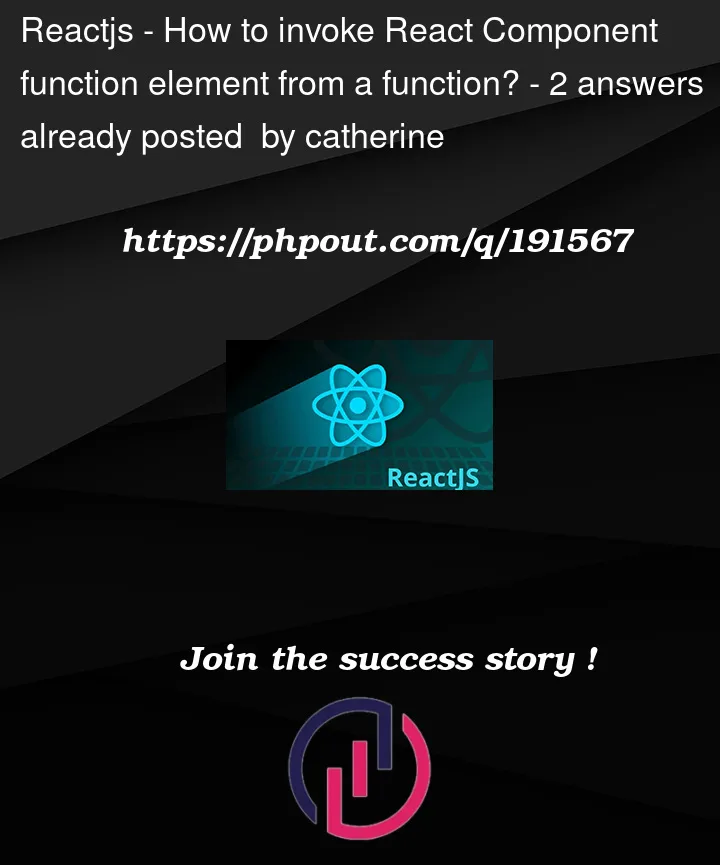I have the below function which calls show a modal dialog on click of edit button. How do I render the functional component UpdateModal from function showModal?
Here is the function:
const showModal = (user: IUser) => {
setShowUpdateModal(true);
return (
<>
<div>Hello</div>
<UpdateModal
user={user}
showUpdateModal={showUpdateModal}
setShowUpdateModal={
(bool: boolean | ((prevState: boolean) => boolean)) =>
setShowUpdateModal(bool)
}
/>
</>
);
}
UpdateModal:
import React, { FC } from 'react';
import { Modal } from 'react-bootstrap';
import styles from "../../styles/user.module.css";
import UpdateUser from './update.user';
import { IUser } from '../../models/user';
type updateModalProps = {
setShowUpdateModal: (open: boolean) => void;
showUpdateModal: boolean,
user: IUser
};
const UpdateModal: FC<updateModalProps> = ({
setShowUpdateModal,
showUpdateModal,
user
}) => {
console.log("showUpdateModal....", showUpdateModal);
return (
<Modal showUpdateModal={showUpdateModal}>
<Modal.Dialog>
<Modal.Header closeButton onClick={() => setShowUpdateModal(false)}>
<Modal.Title className={`${styles.createText}`}>
Create User Form
</Modal.Title>
</Modal.Header>
<Modal.Body>
<UpdateUser user={user} setShowUpdateModal={setShowUpdateModal} />
</Modal.Body>
</Modal.Dialog>
</Modal>
);
}
export default UpdateModal;
User.tsx:
import UpdateModal from './update-modal';
function UserContent() {
const [showUpdateModal, setShowUpdateModal] = useState(false);
const showModal = (user: IUser) => {
setShowUpdateModal(true);
return (
<>
<div>Hello</div>
<UpdateModal
user={user}
showUpdateModal={showUpdateModal}
setShowUpdateModal={
(bool: boolean | ((prevState: boolean) => boolean)) =>
setShowUpdateModal(bool)
}
/>
</>
);
// return (<><div>Hello</div> <UpdateModal user={user} showUpdateModal={showUpdateModal} setShowUpdateModal={(bool: boolean | ((prevState: boolean) => boolean)) => setShowUpdateModal(bool)} /></>);
}
return (
<div>
<Table responsive striped bordered hover variant="light">
<thead>
<tr>
</tr>
</thead>
<tbody>
{data && data.map((user, i) => (
<tr key={user._id}>
....
<td>
<Pen
color="black"
size={20}
onClick={() => { showModal(user); }}
/>
</td>
</tr>
))}
</tbody>
</Table>
</div>
);
}
// display Users
const User = () => {
return (
<UserContent />
)
}
export default User;




2
Answers
The issue is that you can’t return JSX from a callback function and expect React to know it needs to render it somewhere.
The
showModalcallback can update theshowUpdateModalstate and the parent component will be rerendered with the updated state value. From here you just render the modal as part of the render return of the parent component.Update the
showUpdateModalstate to hold a reference to a specific user, or a null value. Pass this to the modal’suserprop. All the modal closing actions should set theshowUpdateModalstate back tonullto close the model.Example:
I think you need to conditionally render the
UpdateModalcomponent in the returned value ofUserContent. Conceptually this is the flow most often seen:This code will trigger rerender when clicking
Penbecause state changes. Then, becauseshowUpdateModalistrue,UpdateModalwill be rendered. However this will require you to reorganize your code significantly.